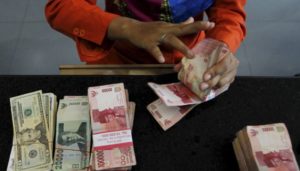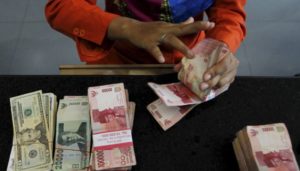Jakarta, MINA — The Indonesian government said its low foreign debt, healthy inflation and good economic growth should ensure that there will be no repeat of the 1998 financial crisis that gripped the country, The Straits Times reported.
A statement underlining these achievements was issued by a senior member of the country’s economic policy team yesterday, aimed at dismissing concerns from political opponents who have played up economic issues to attack the administration.
Indonesia saw millions of job cuts and more than 60 banks were closed during the 1998 crisis.
Also Read: Saudi Arabia Wins Bid to Host World Expo 2030
The country’s foreign debt to gross domestic product ratio today is at 34 per cent, compared with 60 per cent in the 1997 to 1998 period, and back then practically all of its foreign debt was not hedged against currency fluctuations, said Coordinating Minister for Maritime Affairs Luhut Pandjaitan. He is part of the government’s team drafting policies to address economic weakness.
Inflation is at 3.2 per cent for South-east Asia’s biggest economy, a healthy level for a developing country, and economic growth in the second quarter this year was 5.27 per cent, the highest since 2014, Mr Luhut said.
“This shows the government’s good ability to keep stability,” he noted in a statement, arguing that the Indonesian economy is also mostly driven by its domestic sector and investment, with exports contributing only 20 per cent to GDP. “This minimises any impact of the trade war if (it) continues,” Mr Luhut said.
The statement was issued amid the looming trade war between the US and China, and attacks on developing economies’ currencies, including the Indonesian rupiah.
Also Read: 148 Products from Indonesia Promoted at Sarawat Superstore Jeddah
Social media users seem divided by the Indonesian government’s claims.
The optimist camp tends to be the supporters of President Joko Widodo, who is set to run for a second and final term in office next April, while the pessimists are likely supporters of his only opponent, former army general Prabowo Subianto.
The optimists say the rupiah’s 9 per cent fall against the US dollar this year is of minor concern, pointing out that it lost 75 per cent of its value during the Asian financial crisis. But the pessimists counter that the rupiah is hovering around the low value 15,000 to the greenback, a key psychological level in currency markets.
Economist Rizal Ramli argued that Indonesia’s macro-economic numbers showed that worrying signals were already starting to emerge last year so the government must avoid complacency, Tribunnews.com reported.
Also Read: Packaging Industry Supports Halal Ecosystem
Indonesia far stronger
In the statement yesterday, Mr Luhut appealed to Indonesians not to panic given the economy is far stronger than Turkey’s or Argentina’s.
Global investors have been pulling funds out of emerging markets in recent weeks, including Indonesia.
Also Read: Indonesia-Japan Agree on Energy Transition Cooperation
Indonesia’s current account deficit, an important indicator of economic health, is expected to reach about US$25 billion (S$34 billion) this year if no action is taken to reduce it.
The government has pledged to tackle the widening current account deficit by attracting more tourists and increasing the use of local biodiesel to cut fuel imports.
It is also raising taxes on about 1,140 types of imported goods – ranging from electronics to luxury cars. (T/RS5/RS1)
Mi’raj Islamic News Agency (MINA)
Also Read: Dubai Expo 2020 Holds Special Event for Palestine
































 Mina Indonesia
Mina Indonesia Mina Arabic
Mina Arabic